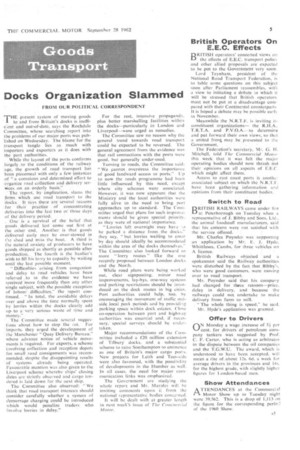Docks Organization Slammed
Page 7

If you've noticed an error in this article please click here to report it so we can fix it.
FROM OUR POLITICAL CORRESPONDENT
THE present system of moving goods to and from Britain's docks is ineffic:ent and out-of-date, says the Rochdale Committee, whose searching report into the problems of our major ports was published on Wednesday. The blame-for the transport tangle lies as much with importers and &porters as it does with
the port authorities. • While the layout Of the ports conforms largely.to the conditions of the railway age, the growth of road transport has been piecemeal with only a few instances of " a conscious and determined effort to organize road collection and delivery ser ces on an Orderly basis...'
'The report, by implication, slams the firms which use road transnort to the docks: It says' there are several reasons for their practice of concentrating deliveries into the. last two or three days of the delivery:period.
, Oneis a survival of the belief that goods "delivered. last come out first at the other end. Another is that goods delivered early may be over-stowed in the shed and miss the boat. A third is the natural anxiety of producers to have goods Shipped as shortly as possible after production. The fourth is the haulier's wish to fill his lorry to capacity by waiting until the .last possible moment. • " Difficultiesrarising from congestion and delay to road vehicles, have been referred to in the evidence we have received more frequently than any other %single subject, with the possible exception of labour difficulties:. the report continued.. " In total, the avoidable delays over and above the time normally spent by lorries within the docks: clearly add up, to a' very serious waste of time and money."
' The Committee made several suggestionsabout how to stop the rot. For imports. they urged the development of the Manchester "Quay Delivery Bureau." where advance notice of vehicle movements is required. For exports, a scheme involving collection and reception depots for. small road consignments was recommended, despite the disappointing results Of systems already being operated. Favourable mention was also given to the Liverpool scheme whereby ships' closing dates arc strictly observed and cargo tendered is laid down for the next ship.
The Committee also observed: "We think that road transport interests should consider carefully whether a system of demurrage charging could be introduced which would penalize traders who involve lorries in delay." For the rest, intensive propagand:I. plus better marshalling facilities within the docks—particularly in London and Liverpool--were urged as remedies.
The Committee saw no reason why the general trend towards road transport could be expected to be reversed. [he general agreement from the evidence was that rail connections with the ports were good, but generally under-used.
Turning to roads, the Committee said: "We cannot, overstress the importance of good landward access to ports." Up to now the roads programme had been little influenced by this need, except where city schemes were associated. Islowever, it was now apparent that the Ministry and the local authorities were fully alive to the need to bring port approaches up to standard. • The Committee urged that plans for such improveMents Should be given special priority, as they wete of national importance.
"Lorries' left overnight may have :o he parked a distance from the docks," they say, " but, lorries waiting to enter by day should ideally be, accommodated within the area of the docks themselves.The Committee also looked forward to more "lorry routes" like the one recently proposed between London docks and the North.
While road plans were being worked out, clear signposting, minor road improvements, lay-bys, one-way systems and parking restrictions should be introduced on the dock routes in big cities. Port authorities could help, too, by encouraging the movement of traffic outside local peak periods and by providiag • parking space within dock estates, Close co-operation between port and highway authorities was essential -and, if necessary,' special surveys should be undertaken.
Major recommendations of the Committee included a £20. million extension of Tilbury. docks, and a substantial scheme to raise Southampton to eminence as one of Britain's major cargo ports. New projects for Leith and Tees-side were also favoured, with the possihility of developments in the Humber as well. In all cases, the need for major communication links was emphasized.
The Government are studying the whole report and Mr. Marple.s will be inviting comments upon it from the national representative bodies concerned.
It will be dealt with at greater length in next week'S issue of The Commercial Motor.






































































































































































